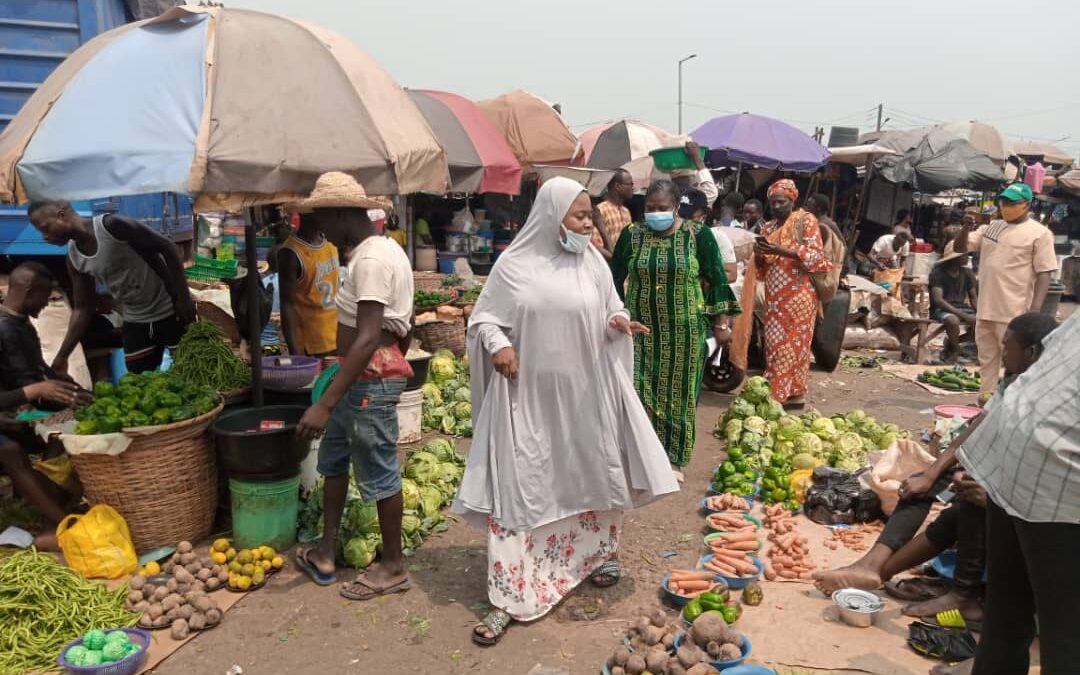
Oct 6, 2025
As a hairdresser in Kaduna State in northwest Nigeria, Tina Danbaba is among workers in the country’s “informal economy”—street vendors, small-scale manufacturers and salon workers—who comprise 92 percent of the workforce. With few or no job protections, women like Danbana not only experience economic instability and low wages, but sexual and physical harassment and violence.
Danbaba wanted workers to be able to support their families without fear—so she helped create the Federation of Informal Workers’ Organizations of Nigeria (FIWON). Through FIWON, the first network of its kind in the region, she connected with others to increase their awareness of workplace violence and harassment in shops and at food stands, and advocated for a safe working environment. Danbaba also often identified cases of abuse.
With support from the Solidarity Center through a project funded by the Bureau of International Labor Affairs (ILAB), Danbaba and others were providing the tools and support for women to know their rights and stand up for themselves. Real change. But their efforts were halted after ILAB, part of the Department of Labor (DOL), terminated funding in March as part of the administration’s slashing of foreign aid and international spending. Six months later, Danbaba is no longer able to document workplace violence and harassment or provide services to survivors and vulnerable workers.
“For women here, it was not about luxury, it was about dignity, survival and courage to start speaking without fear,” Danbaba said. “To take this project away is to push us back into the shadows of exploitation.”
‘For Us, a Loss that Cannot Be Recovered’
The abrupt and unprecedented termination of ILAB funding for Solidarity Center, which Solidarity Center has challenged in a lawsuit, programs in Liberia and Nigeria severed a lifeline for women to gain skills to achieve a safe work environment. And because ILAB programs also operated globally, the impact was far wider.
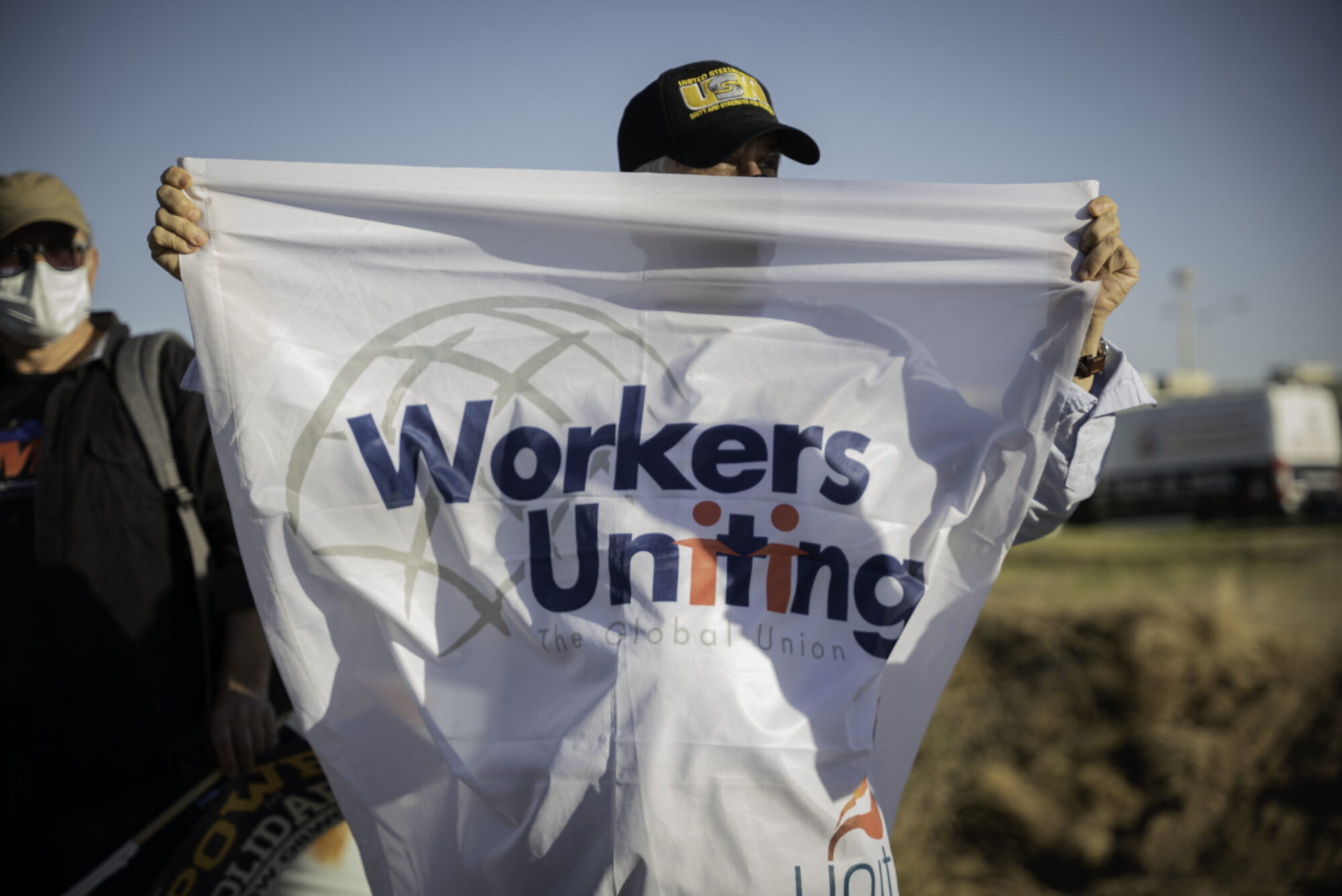
The Solidarity Center received ILAB funding for work in 16 countries and implemented labor rights programs with key U.S. trade partners such as Mexico, Bangladesh, the Philippines and Honduras. Credit: Arturo Left
But in abolishing funding for programs in countries around the world, the move also did even more: It eliminated one of the ways that the United States enforces labor standards in trade agreements, protects American workers from unfair competition and combats child labor and forced labor and exploitation of vulnerable workers around the world.
The Solidarity Center, which received ILAB funding for work in 16 countries, implemented labor rights programs with key U.S. trade partners such as Mexico, Bangladesh, the Philippines and Honduras. These programs helped workers gain collective strength to negotiate decent wages with their employer, improve safety, combat labor abuses and uphold trade commitments.
“The Solidarity Center’s efforts for tea workers improved our lives in many ways,” said Sumon Kumar Tanti, a union organizer among tea workers in Bangladesh.
“Without organized communication, strong knowledge and consistent guidance from the Solidarity Center, our bargaining power is growing weaker every day. This is a loss that we, as tea workers, have no way to recover from on our own.”
Six months after the end of ILAB funding, workers describe how they benefited from trainings and legal assistance to address safety at the workplace, access unpaid wages and build awareness of basic legal rights on the job—and what it means when they no longer can attain these fundamental democratic rights.
Holding Employers Accountable, Not Suffering in Silence
For many of us, drinking a cup of tea is a regular part of the day. Picking the leaves that will make tea is how hundreds of thousands of Bangladeshi workers, mostly women, support their families.
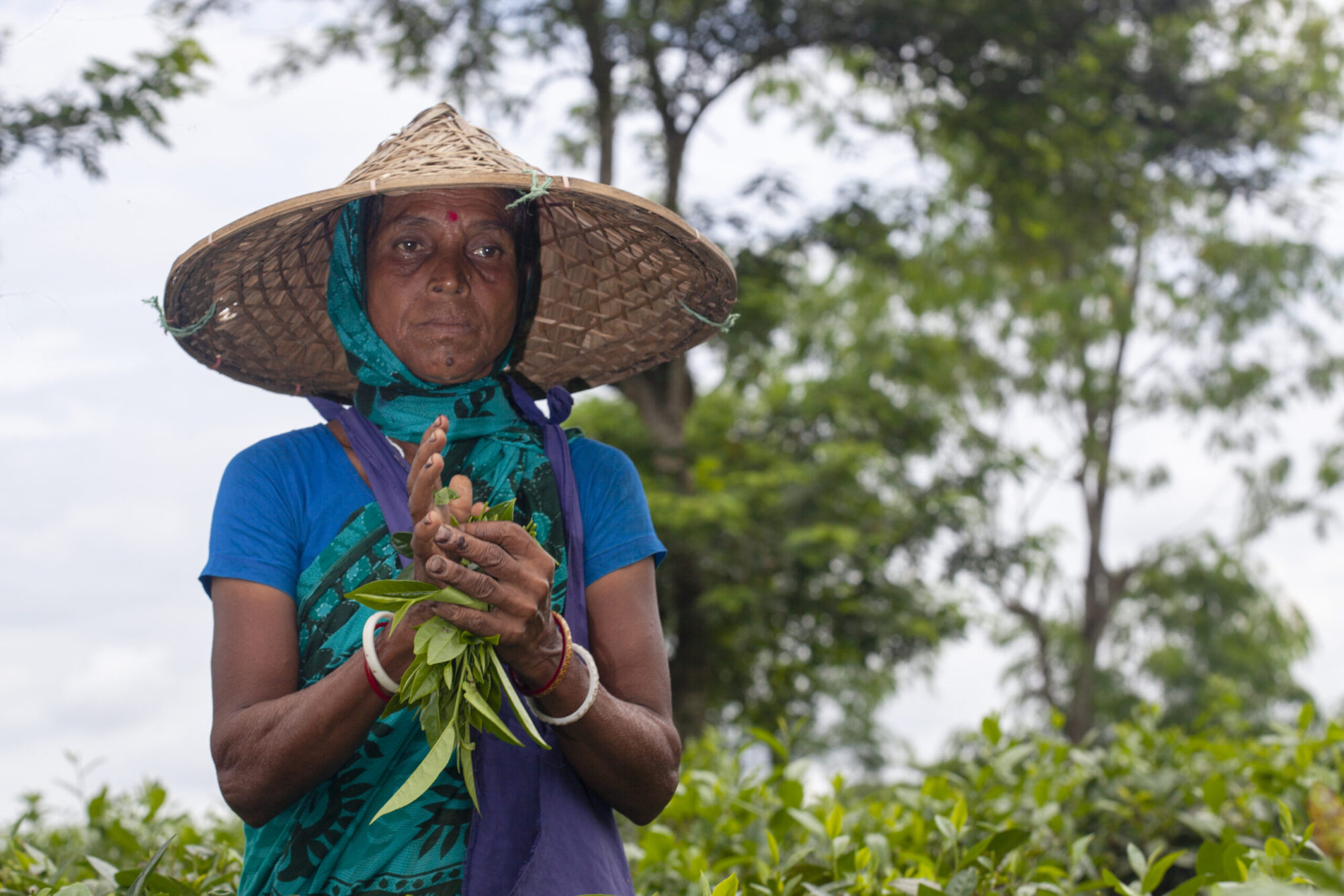
Families often spend their lives living in and working on tea estates, including Bashonti Devi, 40, who, with her husband, picks tea leaves to support their three daughters and son. Credit: Solidarity Center / Gayatee Arun
In Sreemangal, in the northeastern part of Bangladesh, workers leave their tiny, company-provided tin homes and walk long distances across rolling green fields to pick tea leaves for export to the United States and other countries. To meet their daily quota, typically 55 pounds, they will receive $1.55 per day.
Several years ago, after the Solidarity Center began connecting with tea pickers in Sreemangal, they received basic workplace rights for the first time, including a daily hour-long lunch break and access to a medical facility.
“Our community has been historically marginalized and denied basic rights for generations,” said Sreemati Bauri. Vice president of the Juri Valley and Tea Worker in Patharia Tea Garden, Bauri is a tea estate field supervisor and union leader.
“Participating in Solidarity Center’s training gave us the confidence to raise our voice—especially we, the women,” said Bauri. “That knowledge gave us the courage to speak up about our working conditions.”
Tea pickers had access to legal assistance and training provided by the Solidarity Center, which fostered a sense of empowerment and hope among the more than 100,600 workers.
“The Solidarity Center brought legal consultation right to our courtyards, which gave us a safe space to overcome fear, lack of resources and finally seek help,” said Tanti, a field supervisor and organizing secretary for the Rajghat Tea Garden. “Because of this, we could hold employers accountable instead of suffering in silence.”
The termination of funding to enable tea pickers to build a better life “has greatly affected us,” said Bauri. “It has become much harder to maintain the confidence and unity we were starting to build.”
The same story is unfolding elsewhere.
Workers, Business Benefit in the Republic of Georgia
In 2013, the election of a new government in the Republic of Georgia also brought the return of the country’s Labor Inspectorate. The office had been abolished in 2006, a move that contributed to an estimated 74 percent increase in worker deaths, many in mining and construction.
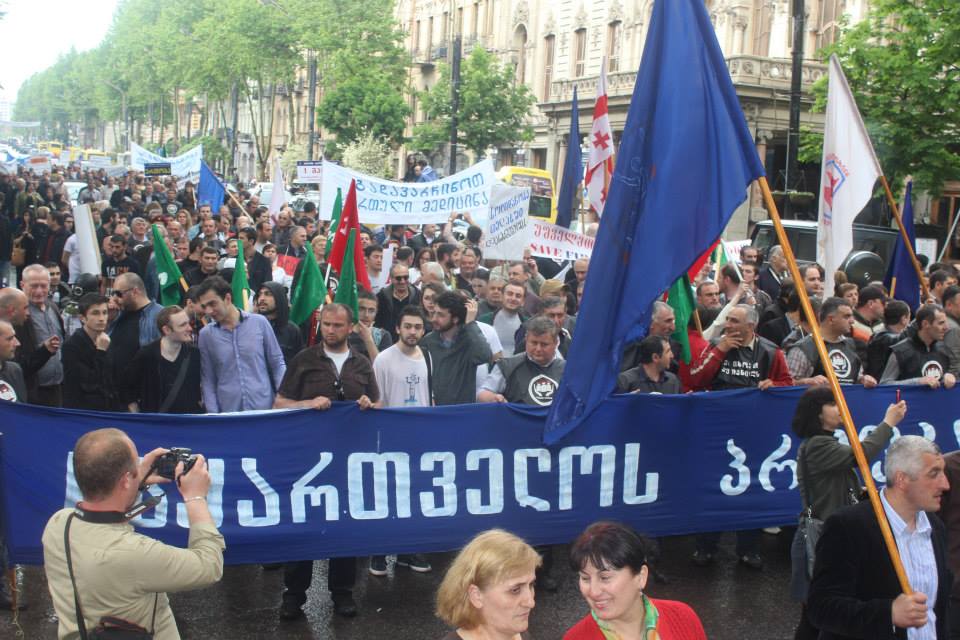
With Solidarity Center support, young workers have been engaged in the democratic process, such as improving their workplaces. Credit: GTUC
While the Labor Inspectorate oversees labor safety, workers in Georgia were unaware of their right to safety on the job and many other workplace basics.
To ensure they knew their rights and how to engage with the Labor Inspectorate’s office, the Solidarity Center, collaborating with the Georgia Trade Unions Confederation (GTUC), reached hundreds of workers in areas with a long history of workplace accidents and fatalities. Workers in mining, construction and heavy industry also took part in trainings to become workplace-level job safety and health experts and assist workers in contacting the Labor Inspectorate when an accident or injury occurred on the job.
“For the GTUC, its collaboration with the Solidarity Center, along with its ongoing support over the years, has been crucial in safeguarding the rights of Georgian workers and strengthening their organizations,” said Raisa Liparteliani. A GTUC general counsel and vice president, Liparteliani is also an executive member of the Georgian Bar Association.
Tamar Ansiani, an organizer with a labor union in Georgia, points to the engagement of young workers. She notes that with Solidarity Center support, she and others “have been fighting successfully for labor rights in different workplaces, including awareness-raising activities that stimulated thousands of young workers to fight for their rights.”
Lawyers for the Solidarity Center provided hundreds of in-person consultations, engaged with thousands of cases via hotline and launched hundreds of legal cases.
“During a seven-year period, with the help of Solidarity Center-funded attorneys, we won more than $12 million for workers via court decisions and collective bargaining,” said Giorgi Diamsamidze, leader of the Agrarian Trade Union/GTUC.
Both unions and businesses viewed empowering the country’s Labor Inspectorate as a path to overall economic growth and modernization. The funding termination ended the work between Georgia’s trade unions and business associations, one that corresponded to positive changes in the country’s labor laws and renewed efforts to better integrate Georgia into bilateral trade networks pointing toward Europe and North America.
As Liparteliani summed up: “The termination has had a significant negative impact on thousands of workers, particularly vulnerable groups, and has considerably weakened the means to protect their rights.”
Brazil Platform Workers: A Voice to Improve Jobs
In Brazil, where traditional employment offering job security and decent wages is decreasing, millions of workers in the country have turned to the “gig economy,” often becoming passenger and delivery drivers to earn a living.
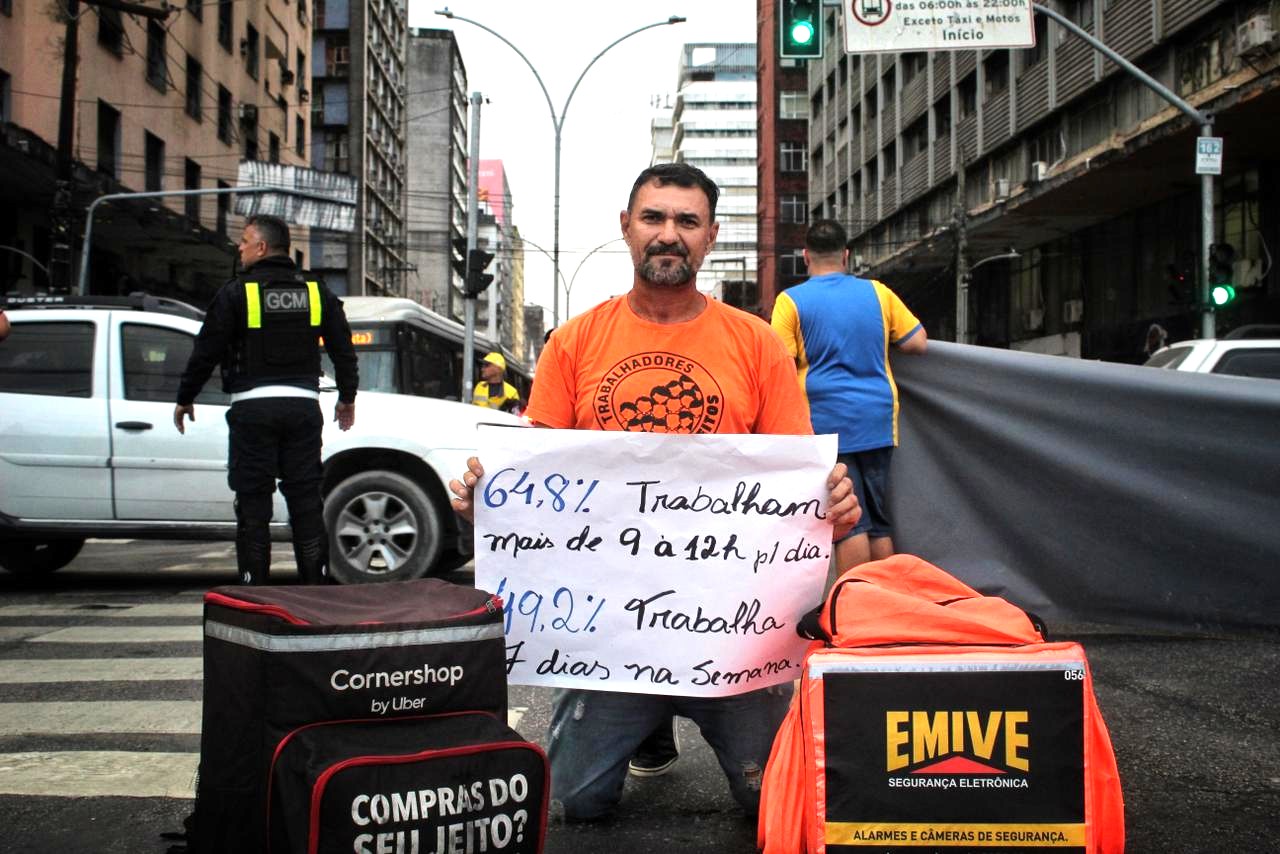
In Brazil, food delivery drivers have held strikes for better working conditions. Credit: Paloma Luna
Yet few such jobs provide wages that support these “platform workers,” who also have no job safety and are subject to unaccountable algorithms that determine kilometers (miles) and randomly lock out workers from their jobs.
“Pay is very low, not enough to meet our basic needs,” said the leader of the João Pessoa Municipal Delivery Workers’ Commission. “We are out on the street all day–12 to 15 hours–to make 100 reales (approximately $18), and even that is a struggle.”
Motorcycle and bike drivers are among Brazil’s 2.1 million app-based workers. In the two years since Solidarity Center’s ILAB-funded program began, digital platform workers have joined together, achieving a voice to advocate for passage of local legislation that combats violence against workers and creates worker support centers.
“The Solidarity Center is crucial to workers’ lives,” the delivery driver said.
Through Solidarity Center efforts at the national level, platform workers consulted with workers in their respective states, and then assisted lawmakers to introduce several amendments that include, for example, adding a right to worker compensation in case of accidents.
With Brazil’s first national negotiations in the digital platform sector ongoing this year, the abrupt funding termination has ended Solidarity Center’s efforts to assist workers to engage in shaping public and legislative debates on regulation.
And as platform workers’ participation in the negotiations has shrunk since funding termination, platform workers lack the means to hold accountable the multinational corporations that oppose regulations to enforce basic rights.
Across Nigeria, Bangladesh, Georgia, Brazil and beyond, workers describe the same story: hard-won progress lost, confidence eroded and exploitation unchecked. ILAB funding once ensured that women could report harassment, tea pickers could win a lunch break, miners could call inspectors, and delivery drivers could push for fair rules.
Now, those lifelines are gone.
Although the organization faces unprecedented threats, the Solidarity Center remains firmly resolved. The Solidarity Center for decades has stood with workers enduring difficult conditions in countries around the world—and will continue to do so. Because all workers deserve the right to form unions, to demand dignity, and to build a better future together.
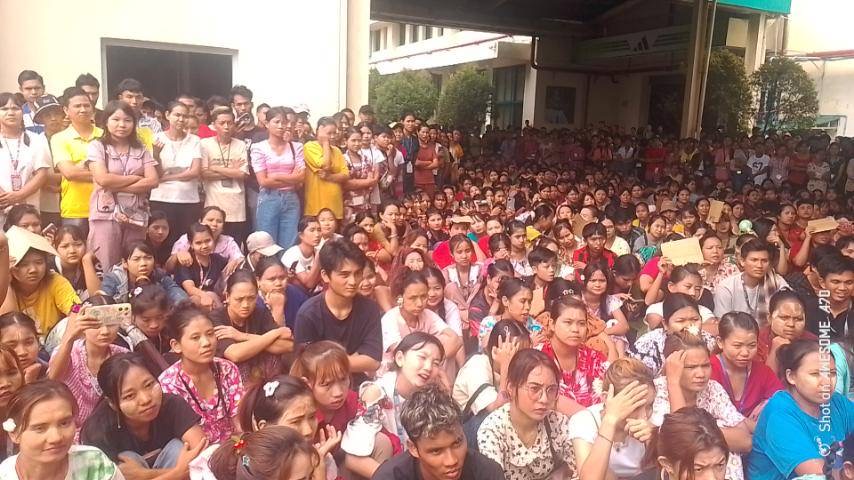
Oct 3, 2025
Because their employer paid them wages so low that they could not cover their basic needs, such as food and housing, some 4,000 garment workers at the Tsang Yih Co. factory in Yangon, Myanmar, recently went on strike. Through collective action, the workers gained leverage at the bargaining table and ultimately succeeded in negotiating a new collective agreement that benefited them and their families.
Garment workers were assisted in their effort for better pay by the Federation of General Workers of Myanmar (FGWM), a Solidarity Center partner, and defied the risks involved in the country where a military coup took power in February 2021.
The right to organize and form or join unions, to bargain collectively and, if necessary, to strike, are core trade union rights. They have also been recognized as fundamental labor rights under international law. Employers have opposed the right to strike for decades and, since 2012, have denied the existence of an international right to strike, despite having recognized it for decades. To settle the matter, workers are making their case before the International Court of Justice.
The right to strike is the difference between workers having a voice or being silenced—and the International Court of Justice’s decision will help determine whether that right is protected for workers everywhere, a cornerstone of democracy that ensures ordinary people can hold employers and governments accountable and prevents power from becoming too concentrated in the hands of the few.
The International Court of Justice is the United Nations’ highest court, and its rulings shape international law and set standards governments around the world are expected to follow.
Fundamental to Workers’ Democratic Freedoms
Since its passage in 1948, International Labor Organization (ILO) Convention 87, a treaty, has been interpreted to protect the right of workers to strike. Convention 87 is also one of the most widely ratified, with 158 countries having endorsed it..
Last year, the parties submitted their written arguments as to whether Convention 87 protects the right to strike, and starting on October 6, the International Court of Justice (ICJ) will hear oral arguments from the ILO, workers, employers and several governments.
“That the right to strike is protected by the right to freedom of association is not in serious doubt, as this has been the consistent understanding of the ILO for more than 70 years,” said Jeff Vogt, Solidarity Center Rule of Law director and Chair of the ILAW Network.
“The court’s advisory opinion is an important opportunity to reassert this long-standing right and put an end to this disruptive dispute brought on by the employers.” Vogt is supporting the ITUC’s legal team in the case and will participate in the proceedings at The Hague. Vogt is also co-author of the book, The Right to Strike in International Law.
However, as former UN Special Rapporteur on the Right to Peaceful Assembly and Association Maina Kiai, explained, the importance of the right to strike goes well beyond the workplace.
“[P]rotecting the right to strike is not simply about countries fulfilling their legal obligations. It is also about them creating democratic and equitable societies that are sustainable in the long run. The concentration of power in one sector—whether in the hands of government or business—inevitably leads to the erosion of democracy, and an increase in inequalities and marginalization with all their attendant consequences. The right to strike is a check on this concentration of power.”
The landmark case is the first time the ICJ is interpreting an international labor convention. Its advisory opinion will have wide-ranging implications for workers and trade unions around the world.
The ILAW Network will post daily recaps on the oral arguments as well as interviews with the lawyers arguing this case. Follow ILAW coverage on Instagram (ilaw.network) to access videos and Twitter (@ILAW_Network) for written daily recaps.

Sep 16, 2025
Two prominent union leaders in Belarus were among 52 prisoners released on September 11. The two political prisoners were arrested in 2022 and 2023 on politically motivated charges for defending workers’ rights.
Both Aliaksandr Yarashuk, chairman of the Belarusian Congress of Democratic Trade Unions (BKDP) and Hennadz Fiadynich, former chairman of the Trade Union of Radio and Electronics Industry Workers’ Union (REP), are now safe in Vilnius, Lithuania.
Their release highlights the vital role of unions in defending democracy, and the ongoing need to support rights defenders facing repression.
Imprisonment, Forced Labor
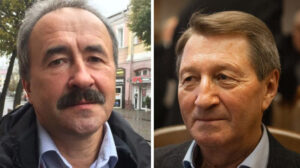
Hennadz Fiadynich and Aliaksandr Yarashuk before they were imprisoned (left) and the two men after serving in prison for several years on politically-motivated charges Credit (left): IndustriAll and Nasha Niva-ITUC; (right) Salidarnast e.V.

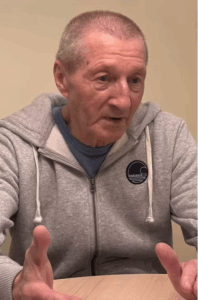 Yarashuk, 73, was taken to a pre-trial detention center in April 2022 after his home and workplace were searched. In December 2022, he was sentenced to four years in a penal colony where prisoners are housed in barracks and forced to perform labor.
Yarashuk, 73, was taken to a pre-trial detention center in April 2022 after his home and workplace were searched. In December 2022, he was sentenced to four years in a penal colony where prisoners are housed in barracks and forced to perform labor.
Fiadynich, former leader of the REP, was sentenced in 2023 to nine years in prison.
At least 25 union leaders remain imprisoned on politically motivated charges in Belarus, where the authoritarian president, Alexander Lukashenko, has held power since 1994.
In August 2020, Lukashenko claimed a landslide election victory, sparking widespread claims of fraud and massive protests and strikes, often led by union members, many of them women. Lukashenko’s regime responded with ruthless repression, leading to deaths, injuries, more than 10,000 arrests and the dismantling of the independent Belarus union movement.
Reports say prison conditions include beatings, inadequate medical care, overcrowding and a lack of proper sanitation.
More than 70 union leaders have been imprisoned, including Sergey Antusevich, vice president of the Belarusian Congress of Democratic Trade Unions, who was released earlier this year.
Before his imprisonment, Antusevic described how workers across the country took a stand against violence and injustice during the 2020 protests. Speaking with Solidarity Center Executive Director Shawna Bader-Blau, he shared his hope for a democratic Belarus.
“My inspiration is the people, people who stand and fight.”
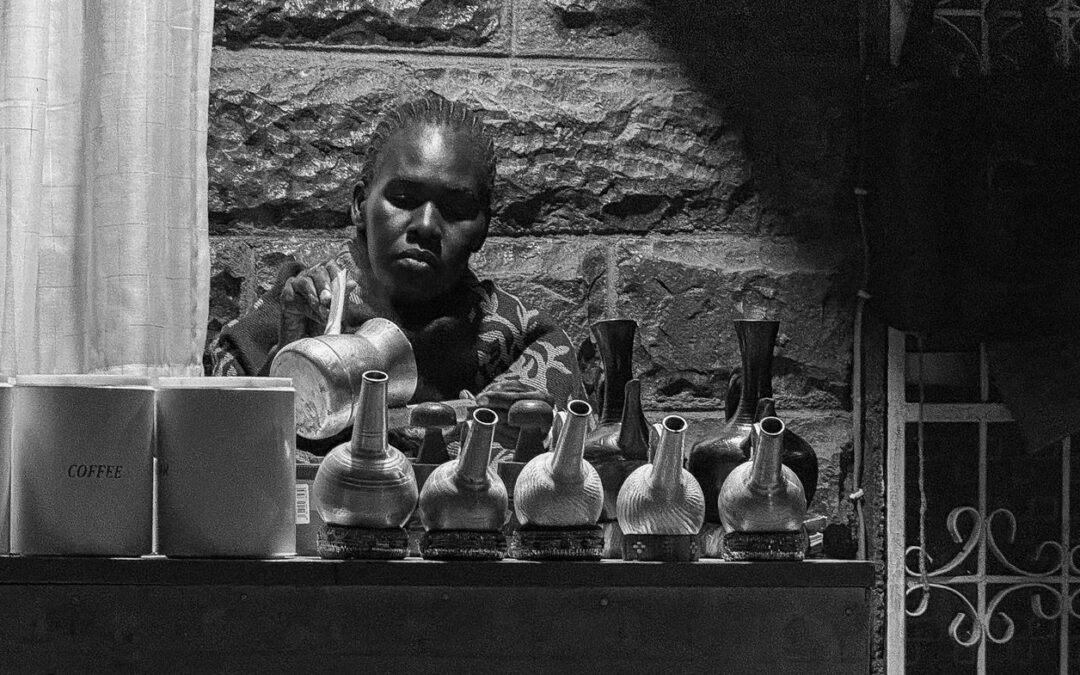
Sep 8, 2025
Each day as Yusriya starts work in her tarabiza in northern Sudan, she sets up the roadside stand with a few pots, a stove, plastic or wooden chairs, and hot beverages such as tea, coffee, ginger, hibiscus and other herbal drinks.
“It was hard at first, but when I see my kids eating because of my work, I feel proud,” said Yousriya, who supports a family of 11.
Yet after a 12-hour day, her income ranges between 15,000 and 20,000 SDG ($25-$30), which barely covers monthly rent (250,000 SDG / $416).
“We need an extra 300,000–500,000 SDG monthly ($500-$832) to live with dignity and manage emergencies or sickness,” she said.
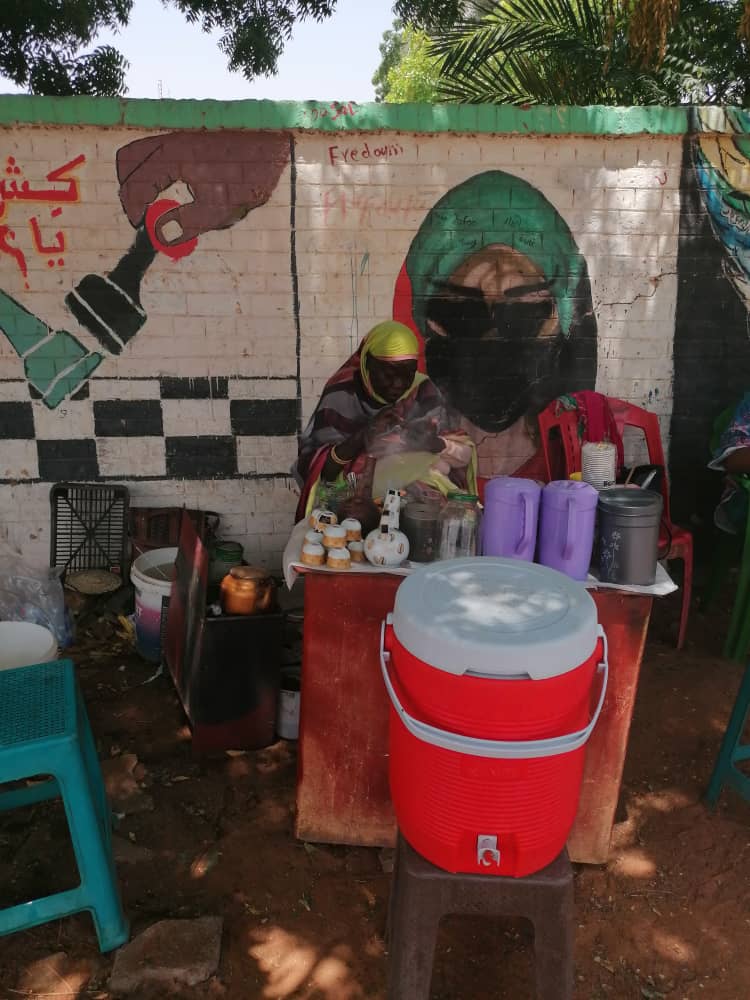
Awadeya Mahmoud, a tea seller in Kenya, is among many workers who needed to move from Sudan during the war to support themselves and their families. Credit: Solidarity Center / Hana Abubaker
Roadside stands where people sit to drink tea are common. Yet tea sellers, who are primarily women, often work long hours for little pay in part because of harassment from government agents forcing them to pay “fines,” damage equipment they must pay to replace or because they have to relocate their stands—often to another city.
As the war continues in Sudan, more and more workers must support themselves in the “informal economy”—jobs not in traditional places such as offices and transportation.
Food vendors, like Yusriya, and domestic workers form a cornerstone of the popular economy yet remain excluded from legal protection and are routinely subjected to forced evictions, arbitrary fines, confiscations, harassment and restrictions on forming unions.
Crafting Tools Workers Can Use to Build Better Lives
To address the steep municipal licensing fees that threaten tea sellers’ livelihoods and exclude them from local decision-making, the Solidarity Center is formalizing an agreement between tea sellers and local governments that improves safety and health and provides the freedom tea sellers need for better wages.
The agreement outlines tea sellers’ commitment. Local governments that sign on will designate specific areas where tea sellers can sell tea and provide work permits or licenses to protect them from harassment by authorities.
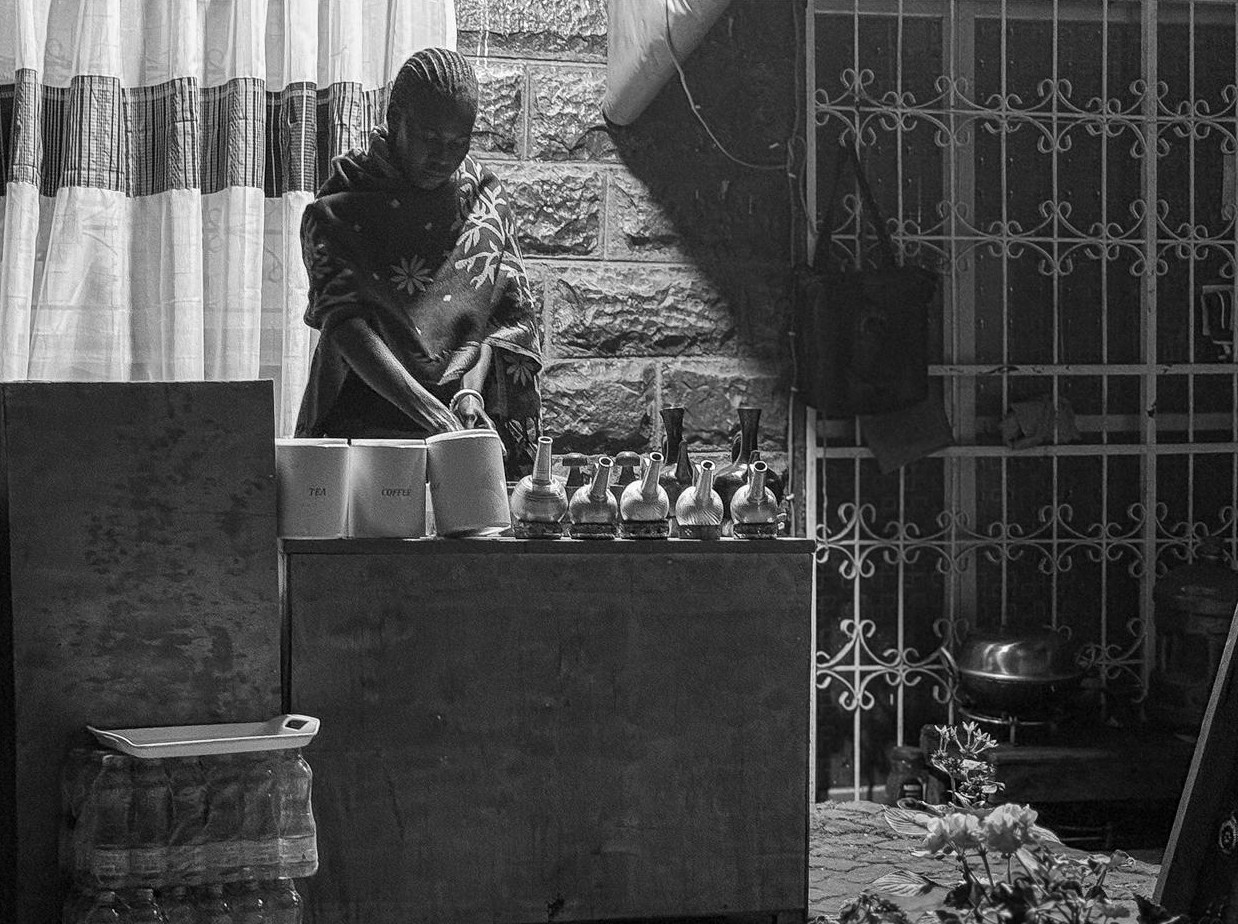
Khadmallah begins selling tea and coffee at 6 a.m. Credit: Solidarity Center / Hana Abubaker
The agreement “will end illegal fines and raids, and give me a fixed place to work,” said Saadiya Mohamed Ahmed Fadl, a tea seller who works daily from 4 a.m. to 7 p.m.
It also ensures tea sellers have access to health care. “Health insurance is vital,” says Yousriya. Workers will be enrolled in the government subsidized medical insurance program and receive access to microfinance funds, enabling them to improve their work and income.
The Trade Union of Tea Sellers and Street Food Vendors, established before the outbreak of the current war, represented an important attempt at organizing. But war disrupted union activity and the Solidarity Center’s efforts to establish agreements with municipalities are key to gaining recognition and reducing harassment at the local level.
In ongoing negotiations, the Solidarity Center is making steps to establish work agreements that provide legal recognition and improve security and fair treatment for tea and food vendors, an essential step toward safeguarding their livelihoods in Sudan’s fragile economic context.
Achieving Legal Protection
With assistance from the country’s legal aid organization in drafting the agreement, the Solidarity Center has crafted a model that can be used across the country. The Solidarity Center is creating agreements in 16 localities in three states, and has now connected with the prime minister and minister of social development to pursue similar accords with the other 15 states.
In securing legalized status and comprehensive legal protections for tea vending as a recognized economic activity, the agreement advances the Solidarity Center’s goals to help workers secure fundamental freedoms-– fair wages, safe workplaces and the right to form associations and unions.
The Solidarity Center also is seeking to register the tea sellers’ association.
Through unions, workers gain the tools, confidence and networks to lead the change they need on their own terms—a goal Yousriya says will provide collective strength to advance. “Forming a union allows me to get a bank loan to expand my business and offers protection,” she said.
In the legal agreement’s first formal violation report that highlighted recent abuse and restrictions tea sellers face in River Nile and Khartoum states, the government committed to take concrete action to protect their human right to work and uphold their dignity.
The Solidarity Center is also advocating for their legal recognition and inclusion in Sudanese labor law and is providing legal aid, rights training and social protection awareness to ensure workers have the tools to stand up for their rights, build stable communities and strengthen democracy.
The agreements and legal success mark a critical milestone in building institutional accountability and opening channels of dialogue between informal workers and state authorities. They also represent an important precedent for ensuring that women working in the informal economy are treated with fairness and respect under Sudanese law.
Establishing a First-Ever Contract for Domestic Work
Domestic workers—who care for children and clean houses—typically also must live in their employers’ homes six days each week, and have no contract with their employer covering wages, hours or working conditions. In Sudan, where some 100,000 make their living as domestic workers, the vast majority are women and girls from low-income or displaced backgrounds.
Together with a legal consultant, the Solidarity Center developed a detailed contract template covering wage payment, work conditions, health access, annual leave, rest periods, accommodation for live-in workers and breastfeeding and prayer breaks.
The Solidarity Center also is seeking to register their association so they can better organize, collectively bargain their work conditions and wages and ensure the agreement and the contract are implemented.
Emtithal Abdo, who supports nine people with her job as a domestic worker, says the contract “raised awareness about our rights-–how to get fair wages that match the nature and effort of the job, and knowledge of basic rights (such as health care and education). It helps balance worker rights and responsibilities, and promotes the right to organize and have a safe and healthy work environment.”
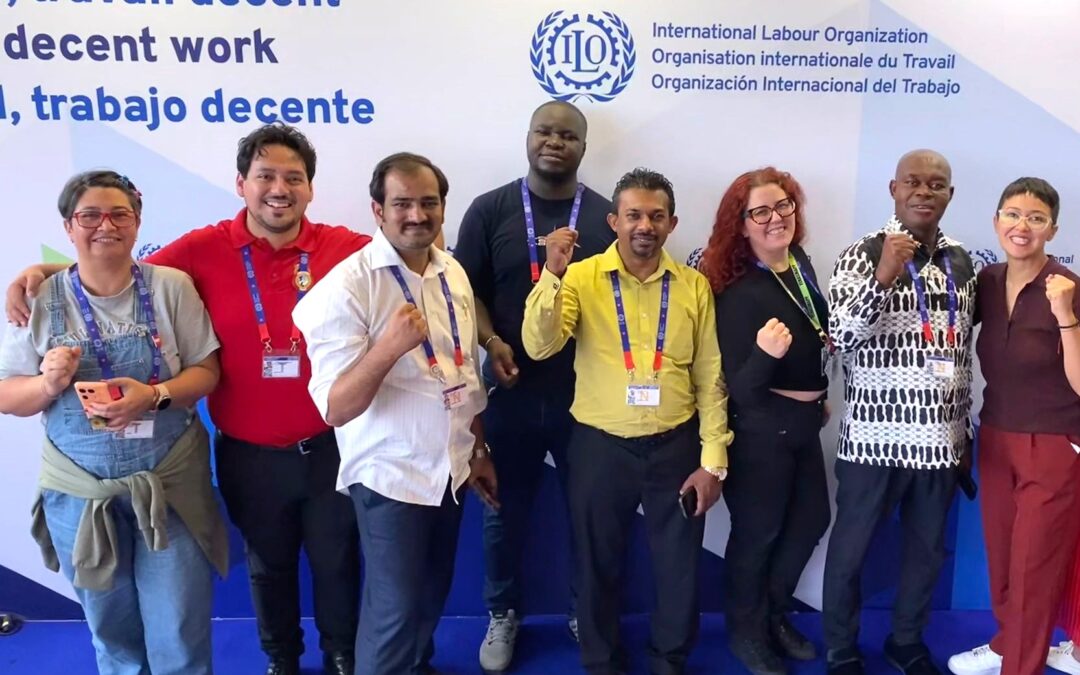
Jul 30, 2025
At the 2025 International Labor Conference (ILC), which took place June 2-14, the Solidarity Center and its partners showcased what happens when workers join together: they speak up and fight for better jobs—and a better world.
The ILC, the annual meeting of the International Labor Organization (ILO), brings together worker, employer and government representatives to debate policy, make decisions and negotiate new international labor standards to promote decent work.
As a result of our unique partnerships with working people and unions from around the world, workers assumed an active role throughout the ILC conference, building on our guiding principle that if working people have the freedom to organize and bargain, they will build more just, inclusive and democratic societies.
With Solidarity Center, Platform Workers Shape a Global Treaty
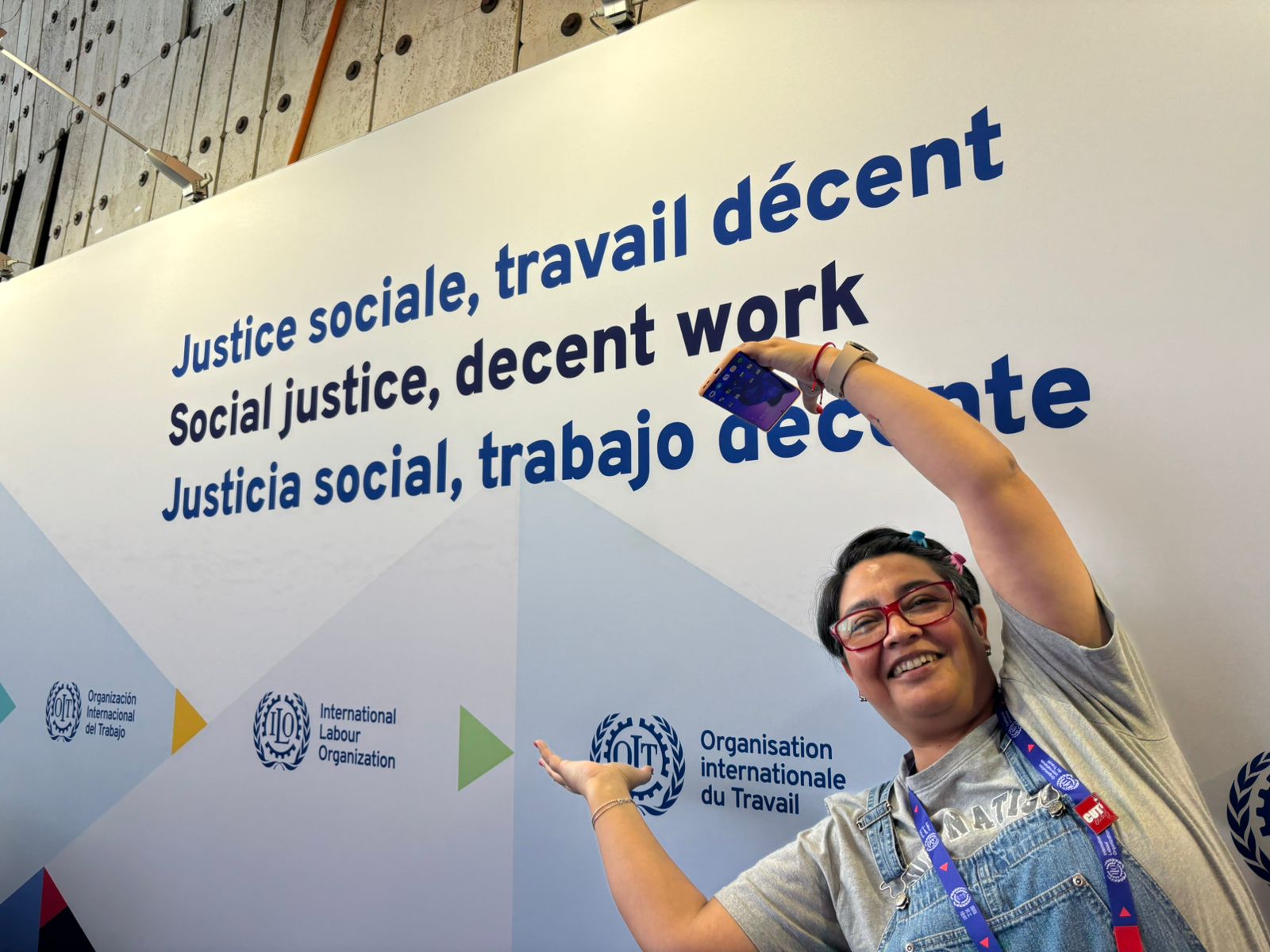
In Chile, Solidarity Center delegate Angelica Salgado Delgadillo heads the Cornershop Union of Uber and serves as a national councilor in the Central Unitaria de Trabajadoras y Trabajadores (CUT). Credit: Solidarity Center
Between 154 million and 435 million workers have online jobs around the world. While platform work is associated with ride hailing and delivery, a broad range of digital platform work is now happening through apps and websites.
A new ILAW Network publication, Taken for a Ride 3 – Lost in a Crowd: How Crowdworkers Are Denied Their Rights at Work, looks at how content moderators, software programmers and other digital platform workers engage in data-related tasks and yet receive no basic workplace rights.
Following years of research and advocacy for the development of a global treaty promoting decent work for app-based workers, led in part by the Solidarity Center’s ILAW Network, the ILO began the process to negotiate a first-ever Convention establishing decent work for platform workers worldwide. (Conventions are legally binding international treaties that may be ratified by member countries.)
“The Solidarity Center Rule of Law team participated actively in the negotiation for a new standard addressing decent work on digital labor platforms, while the Solidarity Center’s Organizing Department coordinated with national platform workers unions to facilitate their participation in the work of the committee,” said Jeffrey Vogt, Solidarity Center Rule of Law director, who also leads the Center’s International Lawyers Assisting Workers (ILAW) Network.
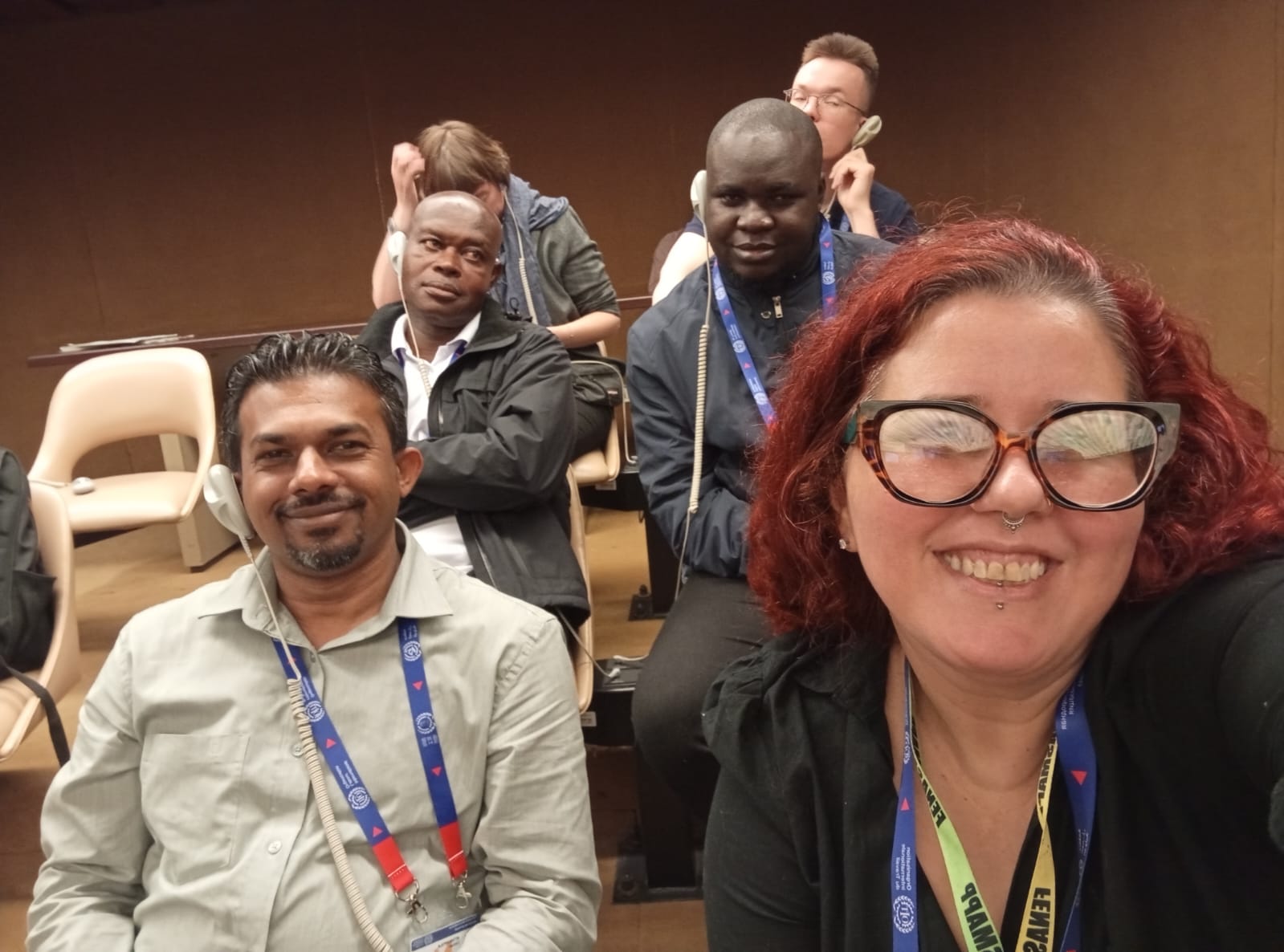
Worker delegates connected with their governments to win support and improvements in an international treaty on the rights of platform workers. Front from left: Charith Attanapola, Sri Lanka; Carina Trindade, Brazil. Rear from left: Philip Aryeh, Ghana; Mophat Okinyi, Kenya. Credit: Solidarity Center
To develop a Convention, workers, employers and government members meet in Geneva to debate and draft its content, and the June conference was the first of two such meetings. Together with digital app-based workers from seven countries, Brazil, Chile, Ghana, Kenya, India, Mexico and Sri Lanka, the Solidarity Center efforts were key to ensuring the proposed Convention and its Recommendations represented workers’ real-life experiences and concerns.
Months before the June ILC met to consider Convention proposals, Solidarity Center worked closely with the platform worker delegates, ensuring they were part of every step—contributing to the ILC’s multiple draft reports, advocating with lawmakers and engaging in training to hone their messages.
“By bringing together workers from multiple regions, the ILC served as a powerful space for South-South exchange,” said Kruskaya Hidalgo Cordero, Solidarity Center field organizing specialist. “Delegates strengthened trust, shared strategies and discussed common challenges such as ensuring labor standards cover digital platform workers.”
Building Worker Power, Democracy
With input into creating the latest draft, the involvement of the Solidarity Center conference delegates was key in discussions and in developing the most recent outline.
Closely coordinating with their unions at the conference, worker delegates provided feedback and recommendations to their government represetatives—who in turn often took supportive positions, raising key points during negotiations and in some cases, adjusting their votes.
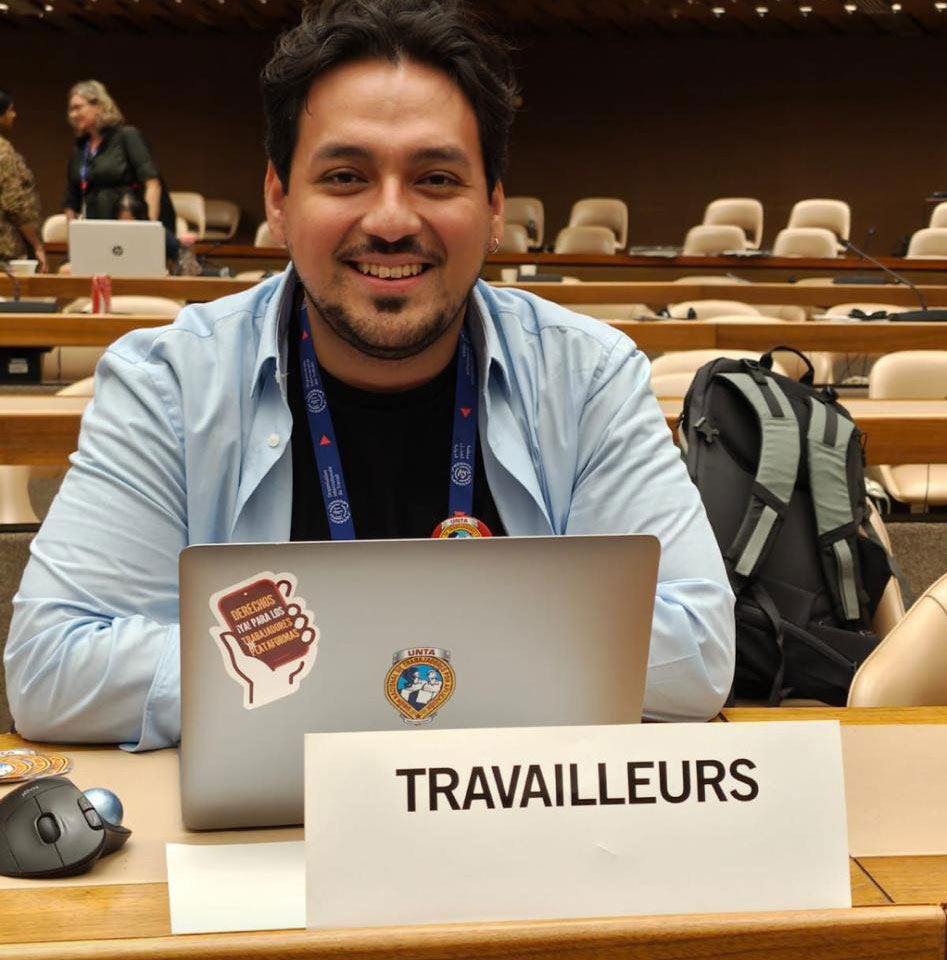
Sergio Guerrero from Mexico was among seven platform workers collaborating with the Solidarity Center to ensure decent work in the gig economy. Credit: Solidarity Center
The result, “Decent Work in the Platform Economy,” was a commitment to a Convention and Recommendation at the end of the process, as well as negotiated definitions and some initial language on the rights of workers to obtain information on automated systems. The platform workers will continue to hone and refine drafts throughout the year, with a final Convention and Recommendation likely adopted at the next ILC in June 2026.
Through ILC participation, the Solidarity Center enabled strong worker power—and worker democracy. Going forward, as part of the Organizing Department’s global platform and broader strategy on platform work, Solidarity Center will create a dedicated space for cross-regional collaboration. Digital app-based workers will take part in a series of virtual exchanges where they will share organizing strategies—strengthening bonds and coordination across regions.
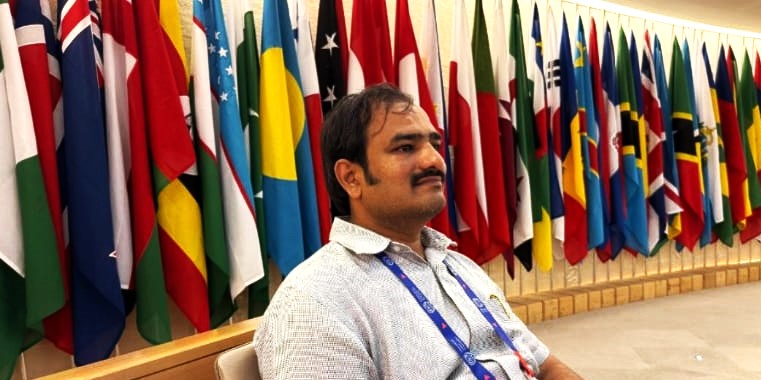
Digital app-based driver, Shaik Salauddin from India, part of the Solidarity Center delegation, frequently reaches out in social media through his union. Credit: Solidarity Center
Creating international connections at the ILC, where digital app-based workers initiated relationships with key global allies , expands connections not only for their organizing networks but also embeds platform worker issues more firmly within global union agendas.
“These interactions deepened the foundation for a worker-led international network capable of sustained collaboration beyond ILC spaces,” said Hidalgo Cordero.
Including Workers’ Voice
To ensure that workers are in the conversations around the informal economy, one Solidarity Center strategy included collaboration with Saida Ouaid, a member of the Democratic Confederation of Labor (CDT) in Morocco.
Ouaid represents agricultural workers, who are among the two billion people globally supporting themselves and their families in the informal economy—including street vendors, domestic workers and tuk-tuk drivers. These workers are not covered by “formal” economy protections, such as job safety and health or health care.
Ouaid actively participated in the ILC general discussion Addressing Informality and Promoting the Transition to Formality for Decent Work to reflect on progress made since the adoption of ILO Recommendation 204 and what else is needed to advance the transition to formality, in recognition that informality remains high.
“Being present gave me the opportunity to voice my organization’s position, which is the urgent need to improve the conditions of informal economy workers and to integrate them into a formal economy that meets the standards of decent work and dignified living,” she said.
The Solidarity Center also provided materials to union partners who sought to participate in the ILC discussions, including several from around Africa. And, the Solidarity Center coordinated positions and priorities with the International Domestic Workers Federation (IDWF), UNI Global and Women in Informal Employment Globalizing & Organizing (WIEGO), key to its efforts to build long-term alliances with global unions and other allies.
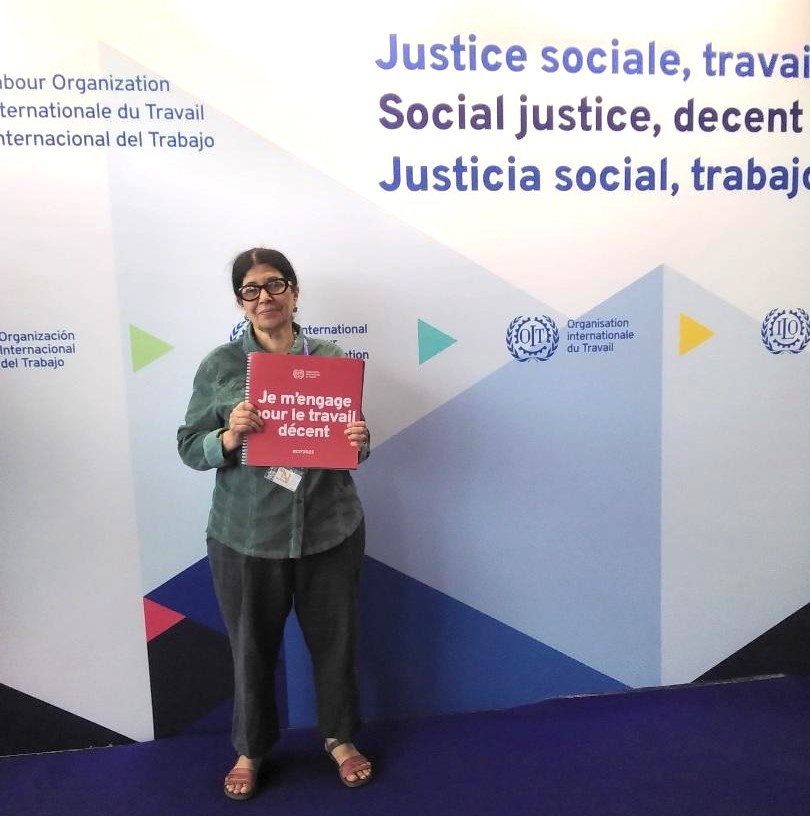
Solidarity Center delegate Saida Ouaid, a member of the Democratic Confederation of Labor in Morocco, pushed to improve conditions for 2 billion workers such as those in agriculture and street vending who are in the informal economy. Courtesy Saida Ouaid
Because working people and their union representative such as Ouaid were a key part of the discussions, they pushed back employer attempts to restrict union membership and collective bargaining to formal workers in accordance with national laws. Ultimately, the final document represents the success of working people in upholding the freedom to form unions and the right to collectively bargain as a right for “all workers” as essential for transitioning to inclusion in fundamental labor rights.
Including workers’ democratic freedom to form unions and bargain together recognizes the Solidarity Center’s core principle that unions are the democratic institutions of the working class that allow working people to stand together, speak up and bargain not only for better jobs, but for a better world.
“Attending this session was a rich and meaningful experience, through the contributions, testimonies and shared experiences of trade unions, during both the Workers’ Group meetings and the general sessions,” said Ouaid.
Workers’ Succeeded in Adding Key Rights
Working in agriculture, as a street vendor or in other jobs in the informal economy increases people’s vulnerability that typically cannot be addressed by a country’s basic labor protections. Workers at the conference were key to the adoption of new language on the necessity of employer and government accountability and creates an environment for transitioning to jobs in the formal economy that lead to worker protections.
Workers’ involvement also shaped the outcomes document so that it represents their lived experiences and the necessity for safe working conditions, by
- Acknowledging the importance of a safe and healthy working environment to decent work and
- Recognizing the role that trafficking, exploitation, stigmatization and harassment in hindering formalization efforts.
“There were a number of important provisions proposed by the workers’ group that were able to ensure the rights of informal economy workers in the final outcomes,” said Erin Radford, senior specialist in Solidarity Center’s Global Worker Empowerment Department.
“In other cases, the workers’ group was successful in eliminating harmful amendments proposed by the employers’ group or governments or in reducing the harm of the amendments. In particular, it was important to ensure nothing in these outcomes would undermine or weaken the 2015 document.”
See all the texts adopted in the June 2025 conference: Texts adopted by the International Labor Conference at its 113th Session.



















